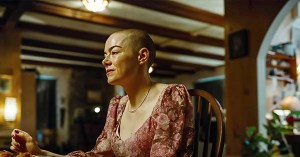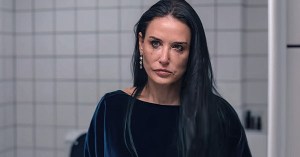Podcast Craze Hits TV and Streaming Hard — and There’s More To Come
Homecoming and Dirty John are the latest podcasts to make the move to the small screen, but not after several high-profile podcast-to-TV flops. Do these series signal a reversal of the trend?

(Photo by Amazon Prime)
Podcasts are invading the TV medium in earnest with adaptations of top series dropping across broadcast and streaming — and even more on the way.
It used to be that the only way to experience a hit podcast was to pop in your earbuds. But now, it’s just as easy to plop yourself down on the couch and turn on the TV. Three podcast adaptations made their television debuts in November 2018 alone — Amazon’s Homecoming, Bravo’s Dirty John, and Oxygen’s Up and Vanished. The first two are now up for Golden Globe awards on Sunday for best drama series and best performance by and actress in a TV drama (Julia Roberts) for Homecoming and best actress in a limited series or TV movie for Connie Britton’s Dirty John performance.
Though the three shows are hardly the first podcasts to make the jump to TV, they do seem to be indicative of the growing trend.
“This year was a big pivotal moment because you had very aggressive formal interest from television and film studios, as well as coordinated and formalized attempts by podcast companies to build that pipeline,” explains Nicholas Quah, a journalist who covers podcasts and writes a newsletter about the industry, Hot Pod. Quah credits one outlet in particular, Gimlet Media, for jumpstarting the adaptation process. The ambitious company’s non-fiction, real-time account of its founding, Startup, became the ABC sitcom Alex Inc., starring Zach Braff.
While the saccharine ABC comedy was quickly canceled (its 40% Tomatometer score reflects its critical appeal), the company’s second attempt has been a resounding success. The Julia Roberts–starring Amazon Prime Video series Homecoming, based on the fiction podcast of the same name, is Certified Fresh with a glowing 98% Tomatometer score. That these two podcasts from the same company had such drastically different fates once they reached the small screen speaks to how variable the podcast-to-TV trend is.
Good podcasts don’t inherently make great TV. There are some things that podcasts can do that TV can’t, and the reverse is certainly true as well. Rotten Tomatoes spoke to the creators of all three of November’s shows to learn about what went into adapting these podcasts, and what that means for the future.
Homecoming’s New Televised Home
Even as a podcast, something about Homecoming always felt cinematic. The scripted radio drama, a psychological thriller about a facility whose purported mission of helping returning veterans transition to civilian life might mask something more nefarious, featured top-tier talent from the start. Actors Catherine Keener and Oscar Isaac voiced main characters, and the dialogue-driven script resembled the flow of a TV show or film. It was a natural fit for television, and many of its characteristics stayed the same when it jumped mediums. The podcast’s creators and writers, Eli Horowitz and Micah Bloomberg, oversaw the TV show as well, with Mr. Robot creator Sam Esmail executive producing and directing. There were some changes, though, like a new, possibly even more star-studded cast (Julia Roberts!), and the whole “adding visuals” thing.
“In the podcast, we really had complete control of information, the questions, and the scope of the story,” Horowitz tells Rotten Tomatoes, noting how the audio-only version of the story didn’t have room for background details or questions. If a character didn’t mention something, it didn’t exist. On a TV show, though, the way objects are arranged on a character’s desk can be telling.
“In the podcast, the whole world is based on voices and ambient tones and when people are speaking to another person,” Bloomberg adds. “When you go to script format or visual, there’s a way to communicate stuff faster and more precise when you can see it.”
He cites the opening of the Amazon show’s fourth episode, a wordless montage of a drug manufacturing process, as a prime example.
“That’s the type of communication that is totally unavailable to the podcast,” he says,” [that] you get so much story from in this two- or three-minute scene.”
Then again, there are other things a podcast does that a television show can’t.
“Audio offers this real immediacy and authenticity and connection with the characters,” Horowitz says. “You can really sink into these conversations and listen to the way you would any conversation. Television, I don’t think, has that. There’s a greater sense of artifice, a greater sense of separation between you and it.”
Horowitz and Bloomberg say they were both focused on making a story that was right for the specific medium when working on both versions of the show. Neither is “the definitive” version, they say. Some people will like both, some might prefer the podcast, and others, like Bloomberg’s mom, will prefer the show.
“My mom couldn’t listen to the podcast,” Bloomberg recalls. “She was bored to tears by it, but she watched the show all in one sitting, got to the end, and was crying. I think they offer different people different stuff, so I think they’re both great in different ways.”
Dirty John Gets the Bravo Treatment
Dirty John, now approaching its series finale, is a different sort of adaptation than Homecoming. Bravo’s series dramatizes the popular true-crime podcast from the Los Angeles Times, which followed the exploits of John Meehan, a serial liar who conned his way into a dangerous, abusive relationship with well-off Orange County designer Debra Newell.
Bravo’s scripted dramatization casts Eric Bana and Connie Britton as the main characters, and retells the story with an uncanny mix of ridiculousness and creepiness. It’s akin to a ripped-from-the-headlines version of Desperate Housewives, which makes sense, given that one of that show’s producers is running the Dirty John series.
“There’s this fun, twisted fairy-tale aspect to the story,” Alexandra Cunningham tells Rotten Tomatoes, explaining that her adaptation doesn’t just add visuals, but is actually able to expand on the emotions of the story by dramatizing it. “A lot of things we’ve maintained — the spine and the scaffolding of the story — because they are so compelling and true and heart-wrenching. We put a lot more flesh on some bones.”
For instance, Cunningham says she was able to address a concern people who listened to the podcast or read the Los Angeles Times articles had raised: Many listeners thought Debra Newell was “an incredibly stupid woman” for falling for Meehan’s exploitative schtick in the first place.
Casting Britton as Newell certainly helped Cunningham combat this perception, and she framed the events in ways that should make viewers more empathetic towards the main character. She was also able to add some more depth to Meehan, who was not a participant in the podcast for reasons that are obvious to anybody who listened to the end. The show can follow Meehan as he goes about whatever dodgy business he was involved in, whereas the non-fiction podcast had to keep the speculation at a distance.
“It gives you an even more complete picture of this man and commits you more emotionally than [you would have been] just [reading] the descriptions of what he did in the podcast, since you’re sort of watching them along with him,” Cunningham says. “It’s a point-of-view perspective that the podcast couldn’t do.”
Up and Vanished Continues the Investigation
True crime might be podcasting’s leading genre, but don’t forget that it’s also been a TV mainstay for decades, dramatized or not. The recent Up and Vanished special, about Tara Grinstead, a teacher and former beauty queen who went missing in Georgia three years ago, is as much a sequel to host Payne Lindsey’s original podcast as it is an adaptation.
“Both mediums rely on good storytelling,” Lindsey says of the difference between podcasts and TV. “Even though a podcast is strictly audio, listeners develop their own visuals for the story. It’s kind of a more intimate experience, and sometimes I think it actually makes the audience feel closer to the people involved.”
The podcast medium offered Lindsey one thing that TV doesn’t. Because podcasts are typically cheaper and faster to make than TV shows, Up and Vanished was able to generate renewed interest in the case that led to a crucial break in real time.
“That would have been a lot harder to do with a television crew on the ground, following a production schedule, along with all of the other elements that make a TV show,” he says.
The Future

(Photo by Syed family/HBO)
The three November podcast-inspired shows are quite different from another, revealing the fundamental wrinkle in any discussion about the future of podcasts on TV: It’s a medium, not single genre.
“There’s a spread of genre that makes this a little hard to talk about efficiently,” journalist Quah says.
The scripted drama–turned–prestige TV Homecoming is a very different beast than the two true-crime podcasts, even if Dirty John turned from non-fiction to scripted when Bravo dramatized it. There are also improvisational comedy podcasts like Comedy Bang Bang and My Brother My Brother and Me, both of which did their audio counterparts proud on TV (and both of which continue in podcast form, though not on television). Then there are the talk shows-with-a-twist, like Desus & Mero and even Bill Simmons’ Any Given Wednesday (to a certain extent), which launched as a result of the hosts’ popular podcasts.
There are even more TV adaptations in the works: Crimetown, a non-fiction podcast about corruption in Providence, Rhode Island, is coming to FX, as is the spooky Welcome to the Night Vale. Fantastically popular podcast Serial is getting an HBO documentary, The Case Against Adnan Syed (pictured above), but a scripted television adaptation of the murder-mystery by The LEGO Movie’s Chris Lord and Phil Miller has been in development hell since 2015. Limetown, a scripted horror podcast, will hit Facebook Watch and star Jessica Biel.
Some of these shows will be good certainly. Others, maybe not so much. That they began their lives as podcasts doesn’t give them an inherent advantage or disadvantage over any other type of adaptation, aside from maybe being more buzzworthy than other series.
“Isn’t it the story that’s more crucial? You wouldn’t say books make good movies — it depends on the book,” Homecoming’s Bloomberg says.
Podcasts have a lot of things going for them: They’re cheap to make, generally flexible productions to undertake, and can connect with large audiences in an intimate way. They’re not a guarantee for success on TV, but the right podcast with the right creative team can, ideally, become something new — something that’s more than just a podcast with pictures.
“The fundamental thing,” Quah says, “is to create something native to the experience.”







